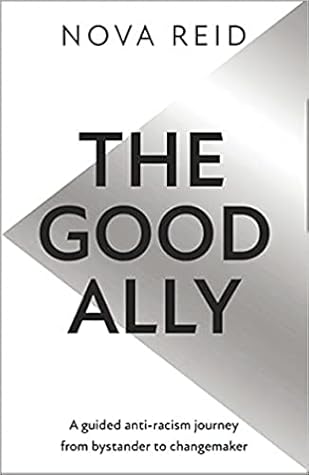Kindle Notes & Highlights
It is the opposite of love. It is lovelessness. And it is this lovelessness that has enabled so many of us to become disconnected from ourselves and each other for far too long.
We are repeating cycles and patterns of behaviour. Until we take individual and, in turn, collective responsibility to address racism, nothing changes. If nothing changes, racism will continue to morph and take on new, insidious and destructive forms that strip us all of our humanity.
Starting to Heal
Being a good ally isn’t about achieving an academic piece of paper or impressing me or anyone else. It is about serving something greater than you.
This work is not comfortable. Nor should it be.
Anti-racism work is about unlearning discrimination that has been normalised; consciously and continuously disrupting the status quo, in society, in work, in others and ultimately, in yourself. That WILL feel uncomfortable. It may even feel discombobulating. You are going to feel guilt and. most probably, shame.
‘White supremacy is not the shark. It’s the water.’ GUANTE1
White supremacy was galvanised in the eighteenth century when white, male European scientists started to fuse a dangerous concoction of prejudice, ignorance and science.
‘If we don’t do our work then we become work for other people.’ LAMA ROD OWENS17
No matter how many law changes there are, no matter how much shock and dismay at deaths on Black bodies, no matter how many racist governments we elect, absolutely nothing will change unless you interrogate how your racism and addiction to white racial power functions.
As author Reni Eddo-Lodge quite succinctly but powerfully puts it, ‘White privilege is an absence of the consequences of racism.’
Systemic racism goes beyond a conscious act of overt hate, leaving most white folk completely and utterly discombobulated. Because if you have only ever positioned racism as conscious and intentional and suddenly discover it can also be unintentional, most white people either dismiss racism entirely, don’t think they are contributing to it and absolve themselves from needing to address it.
Systemic racism and white supremacy have always been about power over another person. If you have been systemically advantaged for so many years, the idea of giving up that ‘power’, societal advantage, and all too-familiar access might feel scary.
We need to talk about performative allyship and your ego, fast. If left unchecked, both can lead you into thinking you are being actively anti-racist when you aren’t. This leads to further wounding.
In case you missed the memo, we have been rescuing ourselves and revolting against the oppressor throughout history.
What we really need you to do is consciously, consistently and intentionally unlearn your racism. That’s the one thing we can’t do for you.
Trying to do anti-racism work while remaining comfortable, to actively avoid confronting feelings is just not possible. Well, I lie, it is, but this leads to performative allyship.
There is a fine line between helping and being performative, but there is a line between the two, and being anti-racist means being able to recognise this.
Allyship in its essence is a person who advocates, collaborates with and works alongside the Black community, who uplifts communities for a shared common goal, driven solely by the cause – to dismantle systemic racism, with a view to treating everyone with basic human dignity and respect. Meanwhile, ‘a saviour’, in black and white, is ‘a person who saves, rescues, or delivers’. Often without consent.
If we have not learned how to self-regulate and self-soothe, feelings of anxiety can become overwhelming and result in these types of performative reactionary responses to alleviate your own discomfort.
When the child ego is running rampant, don’t ruminate. Instead, speak to a peer who is engaged in anti-racism work so you can acknowledge it with self-compassion and not a beating stick, express it and get you back to a more useful state.
Microaggressions are suppressed prejudice coming out and we’ve all been taught to suppress our prejudices. What was once normal, is now not, and unless we intentionally take steps to name and unlearn our ‘isms’, they still lurk beneath the surface or come out when we least expect them in the form of microaggressions in verbal and non-verbal behaviour.
Microaggressions are nothing to do with being good, bad or a downright dodgy human being, but rather, deeply ingrained forms of everyday prejudice that we have learned.
Racism is not a natural part of human evolution; it is learned. If you are not consciously and intentionally addressing your ‘isms’, they will keep showing up. They are an unavoidable by-product of being exposed to cultural norms that, for centuries, have normalised, and legalised structural racism.


